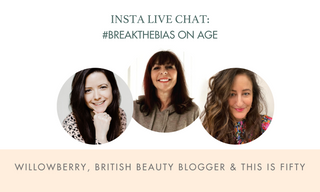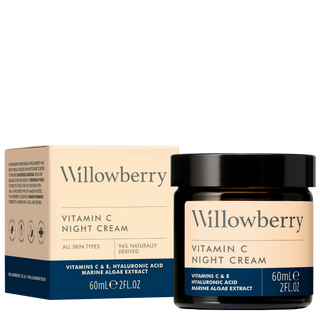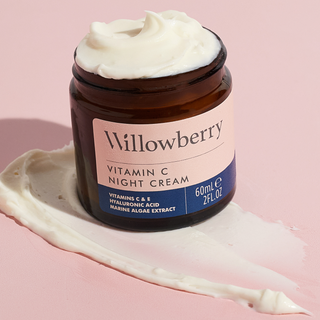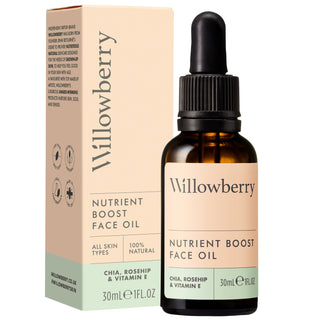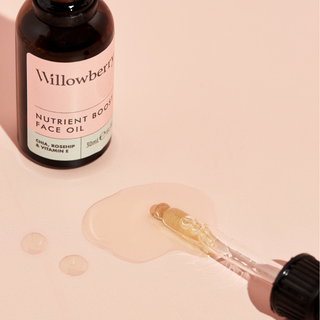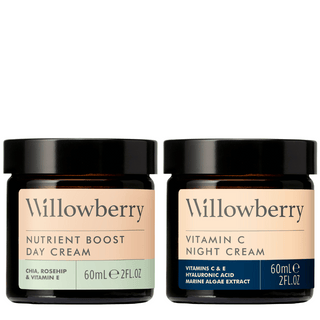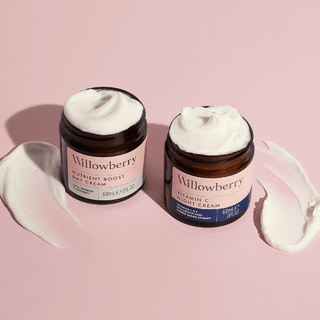Our Willowberry Insta Live Series is held over on our Instagram page. These live chats with expert guests are designed to help you navigate age with confidence and style. Here are the highlights of our recent chat with Jane Cunningham AKA British Beauty Blogger and Genevieve Nikolopulos AKA This is Fifty - you can watch our chat in full here.
For this Instagram Live Group Chat, Willowberry’s Founder Jenni Retourné was joined by beauty industry insiders Jane Cunningham @britbeautyblog and Genevieve Nikolopulos @this_is_fifty.
With years of experience in beauty journalism (Jane) and PR (Genevieve), they know what they are talking about and are unafraid to say it.
In a decidedly lively live chat, Jenni, Jane and Gen dived in for a no-holds-barred chat about the lack of visibility of older women in beauty, the ‘anti-age’ language on beauty products, how things have evolved and what still needs to change. Here are the highlights:
THE 'ANTI-AGE' MESSAGE
Jenni: Ageism disproportionately affects women. Given we’re in the beauty industry, which is all about appearance, do you think appearance plays a part in the bias on age? Men can get celebrated for being a ‘silver fox’ when their hair goes grey and for ‘ageing like a fine wine’, whereas for women, we are largely told to ‘anti-age’ or we get a message of invisibility.
Jane: Maybe it’s because, in the beauty industry, when you get to the very top, it’s all men. They are the ones that set the narrative for major beauty brands.
Gen: I’d love to be able to say that image or looks or the way you present or groom yourself shouldn’t play a part but of course it does, and I think particularly in the beauty industry we’ve all got to present some kind of image because people are looking to that. There’s a certain expectation.
Jane: I often get press releases and marketing materials which are clearly written by younger women who have no experience of going through the ageing process. The language can be very derogatory and just very rude actually without them thinking about it, because being of an older age is just so far away to them. I often think, ‘Do you understand you’re talking to your future self here?!’ but they don’t really understand that this is them, but just not yet.
Jenni: But just as we can’t help being older, younger people can’t help being younger. They’re fed the same narrative about age, so that’s the message they put out. It’s a never-ending cycle.
Jane: I do think it’s a dreadful thing for parents to pass down to their daughters a fear of ageing. One of the best things you can do is never pass that on. Never.
REPRESENTATION OF AGE
Jenni: I think there’s been better age representation of late in the media and by beauty brands. What kind of things have you seen change?
Gen: The big menopause conversation finally hit the news in the last year or so and that’s spearheaded a whole load of stuff. A few years ago, if you’d said you were menopausal, people thought you were really old and dried up and haggard. Now when you’re menopausal, you’re part of this club. We’re part of a conversation that’s going on and that opens up other conversations about ageing and what happens to your skin.
You’ve got brands now putting the word menopause in their marketing material because they think it’s going to sell. Also, the grey hair trend that has come through during lockdown: a lot more people embraced their grey. Maybe people aren’t as ashamed of their age anymore.
Jenni: A viewer of this live chat has commented, ‘But aren’t older beauty influencers not helping by promoting Botox and fillers?’. From my own point of view, talking positively about age is not an anti-Botox movement or an anti-fillers movement. You do what you want to do to make yourself feel good as you get older. It’s just about not feeling like you have to do that to remain beautiful or relevant or seen.
Jane: Ageing is different for everyone and I think knowing that there are ways that you can navigate that journey is quite helpful. What I don’t think is helpful is thinking there is only one type of beauty and that’s a young beauty.
Gen: I think a lot of people think that the people who have treatments are afraid of ageing. For me personally, I don’t have fillers, I just have a bit of Botox but it’s not about anti-ageing, it’s about looking well, because I look tired, and it’s about looking in the mirror and feeling a bit better. I’m 59, I don’t want to look 40, I want to look as best I can for a woman in her 50s.
YOU CAN'T BE WHAT YOU CAN'T SEE
Jenni: You can’t be what you can’t see, so if you don’t see versions of yourself widely reflected in society, whether it’s the media or beauty imagery in store or wherever, then you feel like you don’t match that version of beauty. Social media plays a big part in helping that: seeing people who look fabulous as they are at the age you are really helps.
Gen: It’s about being honest as well. What bothers me, particularly in the celebrity space is when people have had a lot of surgery and they haven’t owned up to it. You look at that and you feel less of a person because you can’t possibly measure up.
Jane: Instagram has filters, but if we go back to the department store days and ridiculously beautiful, young women promoting anti-ageing creams. The photographic filters, the fact the beauty adverts were retouched, the models’ lashes were fake, every single line and wrinkle had been erased.
Now, we’re much more questioning of what we see, which is possibly why the beauty industry has been a bit more prepared to embrace people looking ‘real’ because they suddenly know they are under more scrutiny than they have been before.
Jenni: What do you think still needs to be done?
Jane: I think it’s really obvious what needs to be done: a shift about how beauty is perceived. We do start to see older women in beauty and that’s fantastic. I feel I can see it more in fashion than in beauty to be honest. In beauty it feels a little bit token. There’ll be a big group of women in a beauty advert and there is maybe one older person in amongst 20 people and that’s not really representative. I feel like it’s still being treated with a little bit of hesitation. There’s a big sort of verbal ‘we embrace all ages’ but when it actually comes to it, no they do not.
Jenni: It’s almost this fear for brands that if you speak to women of a certain age or about menopause then you’re alienating other customers.
MENOPAUSE SKINCARE
Jane: I am not a big embracer of ‘menopause skincare’. There is not really very much difference between a face cream that says ‘menopause face cream’ and a standard face cream! It’s all marketing. This is such an important time of your life, why should it be open to flummox people into thinking just because it’s got the word menopause on it, it’s somehow more for you than if it didn’t?! I get furious about it, absolutely furious.
Gen: Menopause skincare doesn’t offend me but what does offend me is if it’s exactly the same as a usual pot of cream but when it’s called menopause you pay £10 more for it.
Jane: I just find it very hard to believe that there’s an ingredient out there that can specifically target menopausal skin as opposed to dry skin or problem skin or all of those things that might naturally occur anyway. I think it’s absolute nonsense. Buy the product that is right for your skin type or your skin concern, regardless of where you are in your hormonal process in life and you will be fine.
Gen: Can I ask you, Jenni? Have you been tempted to use the word menopause on your Willowberry skincare products?
Jenni: No, I haven’t, because skincare comes down to catering for specific skin types and concerns. It may be that as we get older we’re more prone to dryness or dullness, etc and people want to target those specific concerns, but then why not use that language of those specific concerns rather than an anti-age or menopause tag on a product.
But anti-age is a catch-all, easily understood term and it’s why brands use it. People who work in beauty media say to me that anti-age is what people are looking for, it’s what they are searching for on Google, so there’s a commercial value.
EVOLVING THE AGE NARRATIVE
Gen: I think the conversation is starting to happen though and it might be in 5 years people don’t use the word anti-ageing. I know Jenni, you’ve been spearheading this with your brand for a long time. I like to think in a positive way in the next 5 years we might see anti-ageing disappear.
Jenni: I do think as beauty brands and beauty media, it’s our responsibility to help do that.
Jane: There’s a constant image that’s almost solely from the beauty industry that your beauty is something that is slipping away from you. I don’t think beauty is something that gets lost, you don’t ever lose your beauty.
Gen: It evolves.
Jane: It evolves and grows with you, it’s part of you, it’s who you are, like your soul. This narrative about it being something that you are constantly losing is really damaging. It causes those little pinpricks of insecurity, pinpricks of worry, feeling that you’re not good enough, you’re not beautiful enough and that is the root cause of it and it effects every woman every single day of their life, no matter how beautiful they are perceived to be and that is something that is NOT OK!
Jenni: The lack of older women in beauty imagery is sending out that message of invisibility and irrelevance as you get older and reinforces the notion that beauty equals youth.
As you get older you go through a lot of skin changes and look to skincare to help you navigate those changes to look your best, so actually it’s a key time for women and beauty.
Willowberry is nutritious natural skincare for grown-ups, for your best skin.
A favourite with top make-up artists, Willowberry's luxurious award-winning products protect skin’s natural barrier function, to nourish and revive grown-up skin without telling women to be 'anti-ageing'.
As seen in Vogue, Independent, The Telegraph, This Morning and more.

